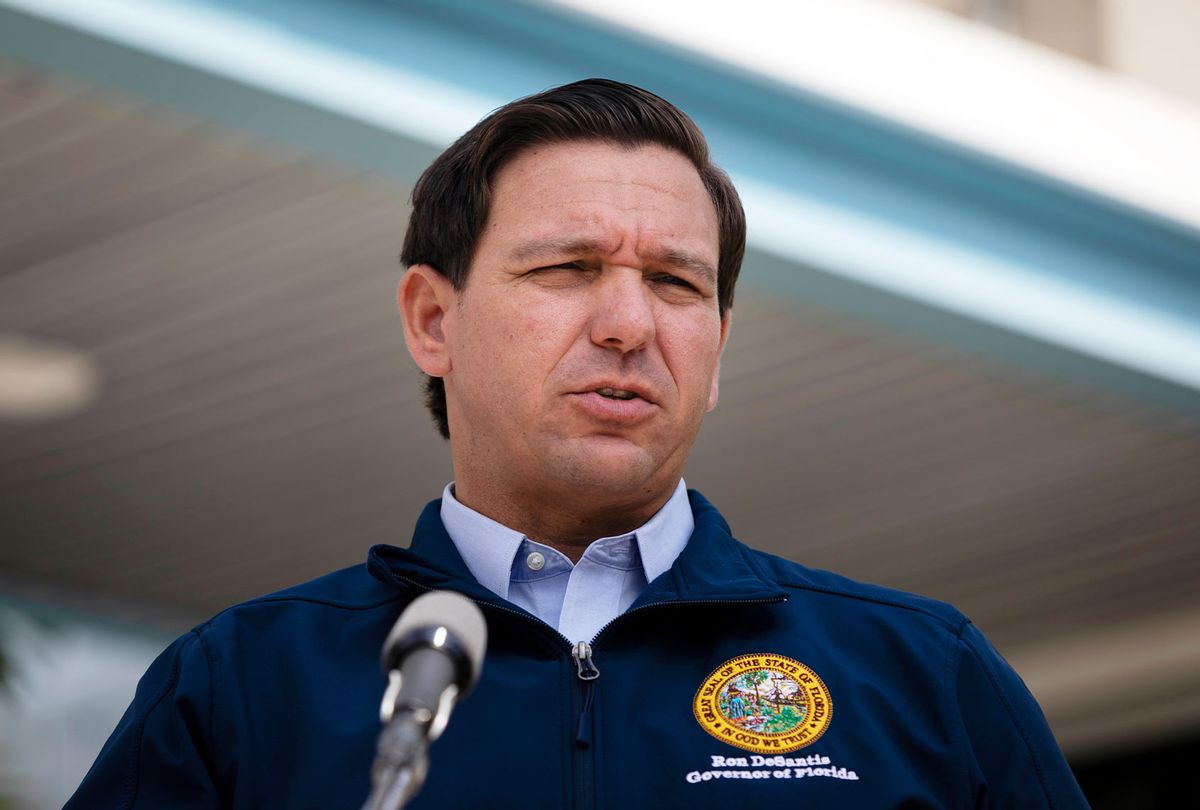A newly uncovered gap in Florida's coronavirus death data suggests that the state may have manipulated the numbers to create more favorable death counts ahead of November's election.
While coronavirus deaths are often recorded days or weeks later, Florida abruptly stopped including deaths that occurred more than one month earlier in its daily count on October 24, ten days before the election. Older deaths had consistently been included in the earlier data. The change came after Florida Gov. Ron DeSantis' administration announced that it would review every suspected coronavirus death before it is reported. The state began to include the older deaths in its daily counts again on November 17.
The discrepancy was discovered by a University of South Florida professor, according to The South Florida Sun-Sentinel. Jason Salemi, an epidemiologist at the University of South Florida, said he was "surprised" by the gap but "drew no conclusions," according to the report, noting that Florida's death data "continues to be a bit of a black box."
The death data between September 23 and October 20 included 1,128 deaths that had occurred at least a month earlier, or 44% of all reported deaths during that span. When the state resumed reporting the older deaths after the election, a large number of deaths had occurred more than two months earlier, according to an analysis by Salemi.
Prior to the gap in the death data, Florida Surgeon General Dr. Scott Rivkees announced that the state would conduct an additional review of the reported deaths before releasing them publicly "to ensure the accuracy of COVID-19 related deaths."
Salemi told the Sun-Sentinel that he initially believed the gap may have been caused by the change that took reporting responsibility away from medical examiners or the state's vow to review the deaths but grew suspicious when the state started to record older deaths again in mid-November.
"I'm starting to wonder what's going on," he said.
Health experts have long warned that coronavirus deaths are likely being underreported but DeSantis and state Republicans have alleged that the Florida deaths are overstated. Florida health officials did not respond to questions from the outlet, leaving the cause of the mysterious gap unclear.
"It's hard to know if there was a limitation around election time or random other things were happening," Scott David Herr, a data scientist who tracks the daily reports, told the Sun-Sentinel. "The Department of Health hasn't explained why lags have been inconsistent. When they keep changing whatever is going on behind the scenes, when the lags keep changing, that is where it gets confusing."
The DeSantis administration has repeatedly changed the guidelines on the reporting of pandemic deaths, drawing outcry from public officials. Medical examiners sounded the alarm in the spring after the state stopped publishing real-time death data reported by local health officials, which showed a higher death total than the state's reports.
In August, as medical examiners dealt with a massive backlog of deaths stemming from the state's outbreak, the administration allowed attending doctors to determine and report coronavirus deaths. The state had also released summaries of death certificate data from county medical examiners through the summer but stopped releasing the data after the change.
State House Speaker José Oliva, a Republican, slammed the state's death reporting in October as "often lacking in rigor" and undermining "the completeness and reliability of the death records."
DeSantis, who has tried to downplay the threat posed by the pandemic for months as it killed more than 20,000 Floridians, has repeatedly been accused of manipulating and concealing data to justify a coronavirus response that the White House coronavirus task force labeled "inadequate."
A task force report obtained by the Center for Public Integrity showed that the Trump administration urged the state to take tougher measures to curb the "unrelenting community spread" earlier this month. Instead, the state stopped releasing the task force's reports and DeSantis barred cities from enforcing mask requirements and limited their ability to contain the spread. On Tuesday, he broke with public health recommendations and announced that all of the state's bars and restaurants will operate at full capacity for the rest of the pandemic.
Earlier this year, the state also ousted Rebekah Jones, a data scientist who helped build the Florida Department of Health's coronavirus data dashboard. Jones claimed that the firing was retribution for her refusal to "manipulate" the coronavirus data to justify the state's early reopening in the spring, which DeSantis has denied. Earlier this month, armed state police raided Jones' home with their guns drawn to seize her computer and electronic devices that she claimed contained evidence of "corruption."
State officials claimed that DeSantis was unaware of the raid before it happened and that Jones was suspected of improperly accessing the state's internal emergency communication system to urge first responders and others to "speak up before another 17,000 people are dead." Jones denied the allegation and alleged that DeSantis was behind the raid, noting that the judge who approved the warrant was appointed by DeSantis just weeks earlier.
"They took evidence of corruption at the state level. They claimed it was about a security breach. This was DeSantis. He sent the gestapo," she wrote on Twitter. "This is what happens to scientists who do their job honestly. This is what happens to people who speak truth to power."
Despite repeated denials from the administration, the incident led to the resignation of a Republican DeSantis appointee on a judicial selection panel, who called the police raid "unconscionable" and DeSantis' denials "fantastical" and "not credible."
He resigned, he said, to draw attention "to the plight of the people of Florida who I feel are not being told the truth about COVID."



Shares